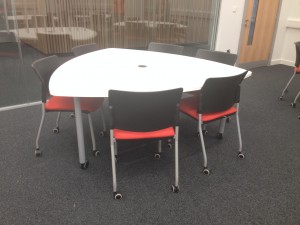The University has new Learning Spaces in the Drysdale Building, one room in particular, ELG12 has unusually shaped tables. These plectrum shaped tables are a new addition to the teaching rooms at the university. They allow for active and collaborative learning due to their shape and are on castors so they can be easily moved to create different layouts for group work. This room has been designed to encourage students to develop their communication and team working skills hence enabling them to engage with the subject matter in a deeper way.
Summary
The activities mentioned below can be used together or on their own in most classrooms but work especially well in this plectrum tables classroom because of the shape of the tables. They compliment each other in small group teaching, hence they have been highlighted here. They work best for classes of up to 25 students but can be used for smaller or larger classes.
Why?
By building group work into your seminars you enable students to exchange ideas and opinions and receive feedback in a safe environment. This helps them to build important critical thinking, team working and communication skills and to develop a deeper understanding of the subject matter.
What type of activities can be done in this room?
ELG12 can be used by upto 24 students and has four tables with six chairs on castors. Each table has a pull up power socket column that can be accessed from the middle of the table, allowing for students to bring in their own devices for use in the room.

Plectrum Shaped Tables in ELG12 for groups up to six. (photo by Santanu Vasant/City University London, CC-BY-SA)
To enable the students to feel comfortable, try an ice breaker activity such as Rounds or Rotating Trios. When groups dynamics are more established, try Buzz Groups and Snowballs, Think Group Share or Jigsaw Classroom together more structured problem solving or case study activities.
Tip: Establish some ground rules for small group work, so that students feel more comfortable expressing their opinions. Let them know this is for their benefit and will aid their learning.
Where else can these activities be done?
We have several new flexible learning spaces:
|
Room type |
Building |
Room |
Capacity |
Notes |
|
Movable tables and chairs |
College |
35 |
– |
|
|
30 |
– |
|||
|
40 |
– |
|||
|
University |
70 |
– |
||
|
32 |
– |
|||
|
25 |
– |
|||
|
25 |
– |
|||
|
Node chairs |
College |
16 |
– |
|
|
25 |
SHS only |
|||
|
Social Sciences |
22 |
– |
For more ideas on group work activities in flexible learning spaces visit http://tinyurl.com/LSgroupwork.
References
This blog draws on the following works:
Brown University, n.d Interactive Classroom Activities [online] Available from: http://www.brown.edu/about/administration/sheridan-center/teaching-learning/effective-classroom-practices/interactive-classroom-activities [Accessed 24.10.2014]
Portsmouth, n.d. Active Learning in Groups Available from: http://www.port.ac.uk/departments/services/dcqe/developingyouracademicpractice/downloads/filetodownload,114568,en.pdf [Accessed 24.10.2014]
Berkley, n.d Teaching Discussion Sections Available from: http://gsi.berkeley.edu/teachingguide/sections/groupwork.html [Accessed 24.10.2014]



Leave a Reply